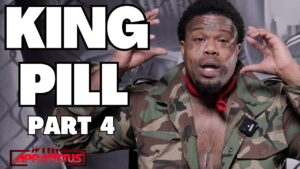In this episode of Let’s Keep It 100 Podcast, Philadelphia’s very own Quilly shares insights into his transformative journey from the streets to sobriety, while also reflecting on his career and evolving music style. Known as one of Philly’s top rappers, Quilly’s presence in the music scene has been shaped by success in freestyle battles and a robust social media following, but his evolution goes far beyond his rhymes.
Quilly’s career began in groups like Topshots and Go-Getters, collaborating with prominent artists such as Meek Mill, and carving a name for himself in Philadelphia’s rap scene. However, it hasn’t been a straight path to success. The rapper candidly discusses his past struggles with drug addiction, revealing how the battles he fought off the mic have reshaped his life. Quilly speaks about the weight of “survivor’s remorse,” admitting that his early lyrics may have inadvertently influenced youth towards drug use. With sobriety now a significant part of his life, he shares how it has shaped his music, drawing a clear distinction between his sober verses and his previous tracks. His personal growth mirrors his musical evolution, as he continues to focus on more thoughtful and purposeful content.
Despite his ongoing success, Quilly has faced criticism for his newer music compared to his earlier work. He addresses these concerns, acknowledging that the difference between his “sober” music and his past catalog is undeniable. But rather than shying away from the criticism, Quilly embraces it, expressing a desire to return to the studio with renewed focus. He aims to produce tracks that resonate with listeners while honoring his journey and personal growth. The shift is not just about music; it’s about a deeper commitment to artistic integrity.
A staple of Philly’s hip-hop scene, Quilly looks back at the era of collaboration that defined his early career. He reflects fondly on working with other local talents like producer Speed and hip-hop icon Beanie Sigel, highlighting the tight-knit, collaborative atmosphere that once permeated the scene. Though the industry has shifted, with social media and digital platforms taking precedence over in-person interactions, Quilly remains grounded in his roots, continuing to nurture relationships with fellow artists and producers.
Looking ahead, Quilly is more than just focused on his music. He has plans to start his own Howard Stern-style podcast, expanding his presence in the media world. The rapper also hopes to get back into making new music and sees his influence extending into the world of fashion and merchandise, where he’s had notable success.
As much as he’s been a voice for Philadelphia’s hip-hop scene, Quilly has faced his fair share of misconceptions. He addresses the idea that he’s arrogant, openly stating that humility has always been at the core of his character. He reflects on how his influence extends beyond music, touching on his impact within the city’s legal landscape through promoting attorney Shaka Johnson. With a loyal fanbase and respect from artists who acknowledge his early support, Quilly’s focus is on staying true to himself and appreciating the positive relationships he’s cultivated over the years.
Through it all, Quilly’s journey from addiction to sobriety, his commitment to authenticity in his music, and his thoughtful approach to his career paints a picture of an artist who’s not only survived the ups and downs of the music industry but has thrived in them. His openness, growth, and plans for the future make him a standout voice in the ever-evolving world of hip-hop.






